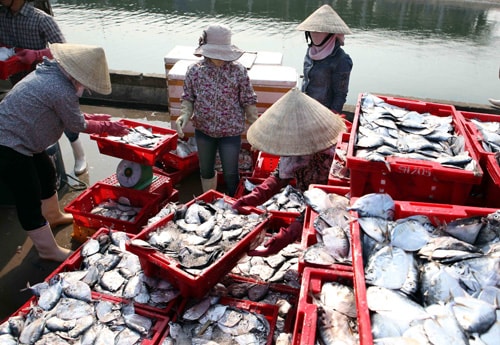The challenge of maintaining marine ecosystems
Marine and coastal ecosystems in Vietnam provide many economic benefits (food, income, employment) and many community values (sightseeing, entertainment, culture) for human life. However, the shrinking area of natural ecosystems, reduced productivity and poor resilience are negatively affecting human life, especially the poor.
The value of marine ecosystems
Vietnam has a diverse marine ecosystem system, including 155,000 hectares of mangrove forests, about 1,300 km2 of coral reefs, nearly 500 km2 of lagoons and about 16,000 hectares of seagrass, many tidal flats and estuaries. These ecosystems have provided many important services to the people, with about 20 million people indirectly affected by these services, 8 million poor people directly dependent on ecosystems.
According to the assessment of the Center for Marine Life Conservation and Community Development: The total value of products and services of our country's coral reef ecosystem is estimated at about 100 million USD, of which 1 km2 of coral reef can provide up to 10,000 USD of seafood catch. In the Mekong Delta, 1 km2 of mangrove forest can provide 450 kg of seafood catch. Each year, the seagrass ecosystem provides aquatic products and services worth over 20 million USD. The value that lagoons bring is estimated at over 2,000 USD/ha.
 |
| Protecting marine ecosystems will help stabilize and improve the quality of life for fishermen. |
Regarding the regulatory values, the coastal protection function of coral reefs can be clearly seen at some points in the Central region such as Bai Tien and Hon Khoi in Khanh Hoa province. Mangrove forests can reduce coastal erosion and protect the coastline from storms and high tides. Each square meter of seagrass can produce 10 liters of dissolved oxygen, contributing to the balance of O2 and CO2 in the water, reducing the greenhouse effect of CO2 absorption into the water.
Each acre of seagrass can produce 10 tons of leaves per year. This biomass provides food, habitat, and breeding grounds for many species of invertebrates and vertebrates, both juvenile and adult. Seagrasses also contribute to the food web, either directly through grazing animals, or indirectly after the seagrass plants die and become detritus.
Risk of recession
According to research and surveys by the Institute of Marine Resources and Environment, Vietnam's marine ecosystems have been degrading in both quantity and quality in recent decades. Only 1% of the 1,300 km2 of coral reefs along the coast are currently in good condition. Coral cover has decreased by 30% in some places during the period 1993 - 2004. Mangrove ecosystems have also been severely degraded since the beginning of the 20th century. The amount of seafood caught per hectare in the lagoon has decreased by more than half in the past decade. Seagrass beds in Khanh Hoa province have been significantly reduced at a rate of 80 hectares per year.
The primary cause of marine ecosystem degradation is the increasing demand for ecosystem services, mainly due to population pressure. For example, the total shrimp farming area in 2000 was only 250,000 hectares, but by 2003 it had reached 530,000 hectares. Currently, Vietnam is among the countries with the largest shrimp farming areas in the world.
In addition, other factors affecting marine ecosystems include overexploitation of coastal areas, destructive fishing practices, unsustainable aquaculture, industrial activities and rampant land use, plus climate change.
To overcome this situation, many experts believe that coastal resources are declining. Therefore, localities need to find and choose another way of doing business for fishermen instead of just exploiting seafood as it is now. That could be the tourism sector or other alternative services, to help future generations of fishermen change the way they make a living.
Some other opinions said that the policy on integrated coastal zone management should be promoted at both the policy formulation and implementation levels. Any enterprise that uses ecosystem services should compensate the benefits to those who depend on these resources. On the other hand, the Government should encourage the development of industries in marine and coastal areas.
According to News






